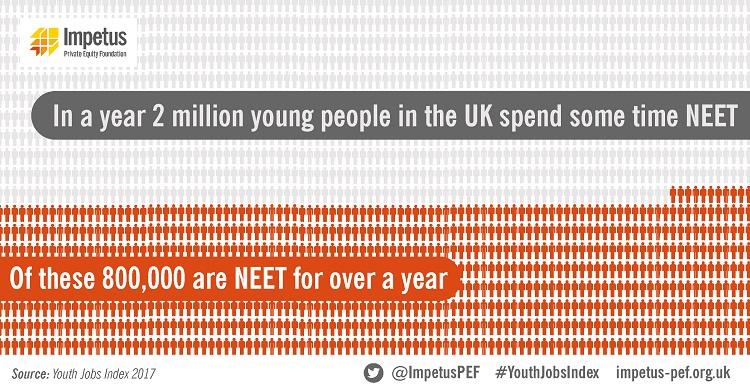NEET numbers increase as progress on youth unemployment stalls

Progress in tackling youth unemployment has ground to a halt with more young people spending over 12 months out of education, employment or training (NEET) raising concerns over the government’s approach.
Reductions in the headline figure of NEETs are cited by the government as evidence of its success in tackling youth unemployment with the latest quarterly figures claiming NEET levels at 800,000 (11.2%) – a 68,000 reduction on the same quarter last year.
But the latest Youth Jobs Index from Impetus-PEF reveals that the number of young people who are NEET for over a year has increased sharply since they reported the figure last year.
Commenting on the findings of the second Youth Jobs Index, Andy Ratcliffe, CEO of Impetus-PEF – a charity that finds, funds and builds the most promising charities working with young people from disadvantaged backgrounds to help them become stronger organisations, said:
“We’ve just come away from an election where the youth vote counted, but our findings show there are still crippling numbers of young people not in education, employment or training who aren’t being counted at all. The headline drop in the number of young people who are neither earning or learning next to the increase in the numbers who are enduring this for over a year, confirms that we have structural problem in Britain that has not gone away.”
Using data produced by the Office of National Statistics (ONS) for the Labour Force Survey, (LFS) the Youth Jobs Index provides a detailed picture of young people’s experiences of being NEET. Unlike the LFS though, it tracks the progress of young people over time rather than giving a quarterly “snapshot”. This means that the index is better placed to track the duration that young people stay NEET.
 Nearly 2 million young people between 16-24 spent some time NEET last year. One in 10 young people (811,000) spent a year or more not in education or work, an increase from the 714,000 who spent more than 12 months NEET in the previous year.
Nearly 2 million young people between 16-24 spent some time NEET last year. One in 10 young people (811,000) spent a year or more not in education or work, an increase from the 714,000 who spent more than 12 months NEET in the previous year.
The negative consequences of being long-term NEET are well known, with those affected experiencing poor mental and physical health and a reduction of £225,000 to their future earning potential.
The risk of being NEET varies depending on qualifications. Young people who fail to secure a Level 2 qualification are twice as likely to be long-term NEET. In contrast, for higher level qualifications there is only a 10 per cent risk of being NEET for six months and a 3 per cent risk of spending 12 months NEET.
Similarly, the likelihood of leaving NEET status is also linked to qualifications, with young people with Level 2 qualifications just as likely as those with higher qualifications to be in work, education or training for more than six months.
Andy Ratcliffe continued:
“We know from the research that young people who spend a long time out of school, work or training are some of the most disadvantaged with few or no qualifications. We also know that getting Level 2 qualifications is a strong means to escape. It’s vital that we fix the broken re-sit market, funding FE colleges and ensuring high quality teachers are in place to provide a real second chance for young people without Level 2 qualifications to get them.”
The analysis also showed a gender split. Women make up the majority of young people who are economically inactive –unavailable for work. In contrast men comprise the majority of young people who are unemployed NEETs. Moving beyond the snapshot period of the quarterly NEET figures, the analysis revealed that young people who are unemployed spend intervals in work or education, but are likely to fall back into being NEET. Economically inactive NEETs were less likely to experience this ‘churn’ in and out of work. However, for both groups, around half that started the year NEET ended it NEET too.
The Youth Jobs Index was put together by the Learning and Work Institute.
 Tony Wilson, Policy and Research Director, Learning and Work Institute said:
Tony Wilson, Policy and Research Director, Learning and Work Institute said:
“Recent falls in the number of young people not in education, employment and training are welcome, but they disguise a more complicated picture that we’re now shedding light on. Too many young people experience long periods or several spells of being outside of learning and work. We need to ensure that our education and employment systems better support these groups. This means ensuring that they are better able to identify them-not relying on snapshot numbers which can encourage short-term programmes and responses, but focusing on longer term solutions.”
Responding to the second Youth Jobs Index, Rob Cook Operations Director of TwentyTwenty an employment skills charity with a successful track record in helping young people NEET into work or training said:
“Young people who are NEET are all different. The needs of a young person who has just graduated from college or university and who’s planning their next step is very different from those of a young person who has no qualifications and has been out of work for over a year. The focus needs be on targeting tailored support to those who need it most and ensuring that the resources are in place to do this.”
Andy Ratcliffe concluded:
“We have to get away from the point in time measurement to a more detailed examination of those young people who are neither earning nor learning and find effective ways to support their escape into long-term education and work.”
A Government spokesperson said:
Our reforms are ensuring all pupils are leaving school better-prepared for further study and the world of work. The latest figures for the UK show that the number of 16-24 year olds who are NEET is at a record low and that young people are participating at their highest rate since records began.
“But we are determined to see even more young people, whatever their background, gain the skills to get on in life and help build a stronger country. The steps we’re taking to strengthen the curriculum, develop gold standard qualifications and provide high-quality apprenticeships, alongside our reforms to technical education will match the best education systems in the world and keep pace with universities’ and employers’ demands.
 About Impetus – The Private Equity Foundation (Impetus-PEF): Transforming the lives of young people from disadvantaged backgrounds by ensuring they get the right support to succeed in school, in work and in life. We find, fund and build the most promising charities working with these young people, providing core funding and working shoulder-to-shoulder with their leaders to help them become stronger organisations. In partnership with other funders we help our charities expand and we work to influence policy and decision makers so that young people get the support they need.
About Impetus – The Private Equity Foundation (Impetus-PEF): Transforming the lives of young people from disadvantaged backgrounds by ensuring they get the right support to succeed in school, in work and in life. We find, fund and build the most promising charities working with these young people, providing core funding and working shoulder-to-shoulder with their leaders to help them become stronger organisations. In partnership with other funders we help our charities expand and we work to influence policy and decision makers so that young people get the support they need.
The Youth Jobs Index was compiled by the Learning and Work Institute for Impetus-PEF. The research findings are based on data from the Labour Force Survey produced by the Office of National Statistics (ONS). The data used for the index consists of eight waves of five quarterly interviews conducted through a sample of 40,000 households covering 100,000 individuals. The data sets cover the period January 2014 to December 2016. Contact Impetus-PEF for a summary of the report.
Research into the long-term impacts of NEET status found that young people who had experience of being NEET saw reductions of annual earnings for up to 20 years after being NEET of between 13-21% for multiple periods of being NEET and 9-11% for a single period of being NEET.











Responses